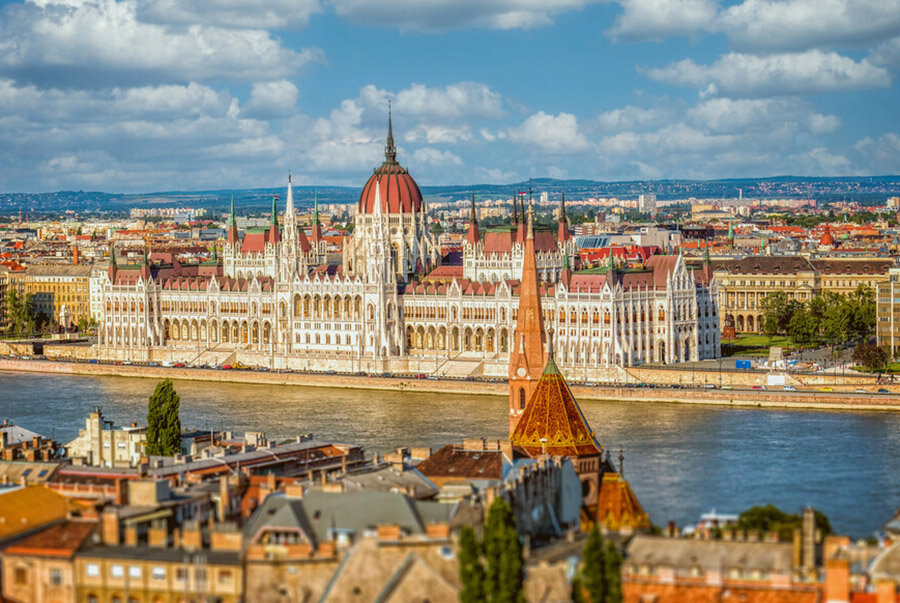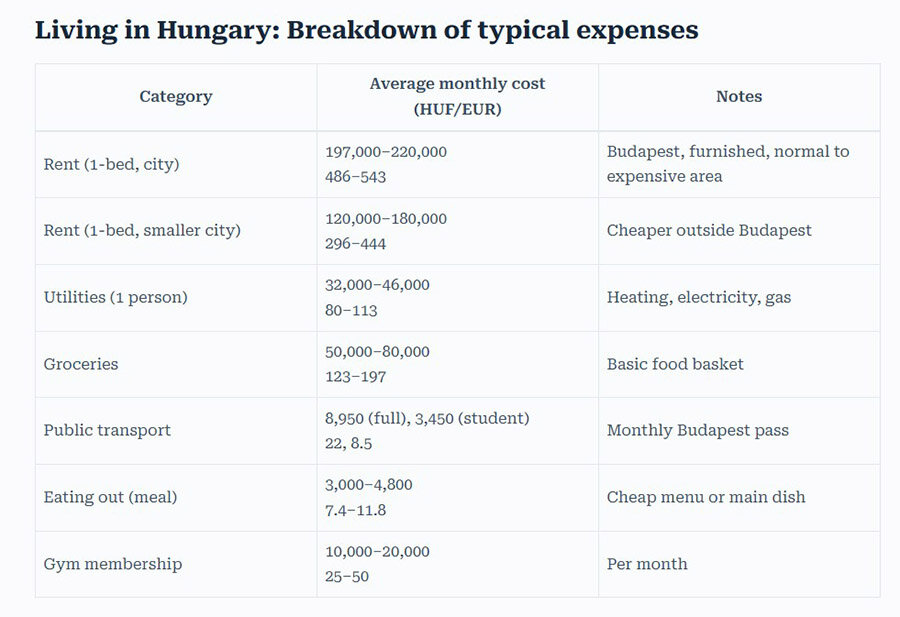Cost of Living in Hungary in 2025: Prices, Salaries, and Living Conditions

Hungary remains one of the most affordable and culturally diverse countries in Central Europe, although rental prices in Budapest are recognized as some of the highest in the region, writes Daily News Hungary. The publication provides a comprehensive overview of current prices, wage levels, and key aspects of life in Hungary in 2025.

Monthly Expenses
For a single person, monthly expenses are approximately HUF 250,000–350,000 (€616–863), depending on lifestyle and choice of housing. For a family of four, this figure approaches HUF 1,090,000 (€2,700), including rent. Overall, the cost of living in Hungary is around 40–50% lower than in countries like Germany, France, or the United Kingdom. Prices are somewhat higher in the capital, but even in Budapest, living costs remain significantly lower than in major Western European cities.
Housing: Rent and Utilities
Budapest is noted as the most expensive city, where renting a furnished one-bedroom apartment in the city center averages HUF 197,000–220,000 (€486–543) per month. In smaller cities, the rent can be significantly lower—from HUF 120,000 to 180,000 (€296–444). Heating, gas, and electricity cost between HUF 32,000–46,000 (€80–113) per month for a standard apartment.
It’s worth noting that the government has removed the real estate component from the “Golden Visa” program — foreigners can no longer obtain residency based on property purchases.
Groceries
A basic grocery basket costs around HUF 50,000–80,000 (€123–197). Bread costs HUF 500 (€1.23), a liter of milk ranges from HUF 400–466 (€1–1.15), and chicken breast can be purchased for HUF 1,089–2,800 (€2.7–7). A pack of 12 eggs costs about HUF 1,252 (€3), a kilogram of apples is HUF 700 (€1.73), and a 0.5L bottle of beer in a supermarket is about HUF 376 (€0.93).
Dining out can range from HUF 3,000–4,800 (€7.4–11.8) for a cheap meal or main dish. A full dinner for two at a mid-range restaurant costs approximately HUF 12,000–18,000 (€29.6–44.4).
Other Expenses
A monthly public transport pass costs HUF 8,950 (€22), while a student pass costs HUF 3,450 (€8.5). A gym membership ranges from HUF 10,000–20,000 (€25–50). Cinema tickets cost HUF 2,800–3,100 (€7–7.7), and theatre tickets range from HUF 2,700–8,000 (€6.7–19.75).
Salaries
Salaries in Hungary remain lower than in Western European countries, but have shown gradual growth in recent years. According to the Reed 2025 Hungary Salary Guide, companies have exercised cautious hiring due to recent economic turbulence, though optimism has increased in the industrial sector. Inflationary pressures are easing, although consumer confidence is recovering more slowly. Many businesses focus on cost reduction and retaining key staff, expecting previously postponed investment plans to materialize during the year.
Conditions for Residents, Foreigners, and Students
Hungary’s affordable cost of living attracts both locals and foreigners. Public healthcare and education services meet EU standards, while private services are significantly cheaper than in Western Europe.
Major cities such as Budapest offer a vibrant cultural scene, a modern standard of living, and strong infrastructure for expats. Smaller cities like Debrecen, Szeged, and Pécs offer a more relaxed pace of life and good access to academic environments for foreign students.
English is widely used in tourist areas and among younger people, but learning Hungarian is recommended for full integration into daily life.
Pros and Cons
Advantages highlighted include the low cost of living, vibrant culture, and beautiful cities. Additionally, the country offers favorable tax rates (15% personal income tax, 9% corporate tax).
Disadvantages include low average wages, the impact of inflation, and potential bureaucratic challenges. Integration can be quite challenging for foreigners due to the complexity of the Hungarian language.
Hungary’s Economy: Expert Forecasts
The country anticipates improvements in living standards and greater economic stability, supported by expanded family assistance programs and housing subsidies. For foreigners and students, Hungary remains an affordable and convenient location in the heart of Europe, offering accessible living costs, extensive modern services, and a unique cultural landscape.
However, experts do not predict rapid economic growth. According to the OECD, Hungary’s GDP is expected to grow by only 0.9% in 2025, but by 2.4% in 2026. Inflation expectations stand at 5.6% and 3% respectively. The budget deficit is projected at 4.2% in 2025 and 4% in 2026. Key drivers of growth in the coming period will remain the recovery of domestic demand and an acceleration of the investment cycle in 2026.








